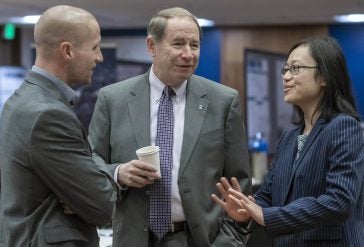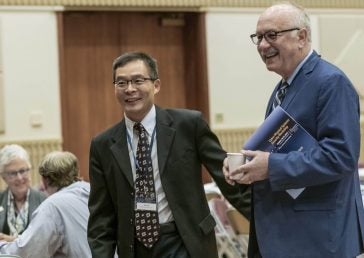
By Neil Nachbar
Experts in cyber-physical systems security from government, academia, and industry gathered at the University of Rhode Island for a workshop on Oct. 18-19.
Attendees participated in keynote addresses, panel discussions, poster and networking sessions, and focused breakout discussions.
“The workshop provided a unique opportunity for experts across the nation to address advancements, opportunities and challenges in smart grid security research and technology development and adoption, as well as education and workforce development on cyber physical systems security,” said Haibo He, URI engineering professor and co-chair of the workshop.

One of the speakers was Gwen Holdmann, director of the Alaska Center for the Energy and Power, located at the University of Alaska Fairbanks.
The workshop was a great opportunity for researchers working on applied solutions to improved cybersecurity to exchange ideas to spark future collaborative research in this area,” said Holdmann. “It is a very timely topic. The fact that the workshop coincided with a major weather-related power outage highlighted the importance of grid security and reliability.”
Chen-Ching Liu, American Electric Power Professor and director of the Power and Energy Center at Virginia Tech gave a keynote presentation on the first day and led a breakout session on the second day.
“The workshop provided a holistic view of the challenges and opportunities of cyber-physical systems for defense and other industries,” said Liu.
Mukund Ravipaty, director of enterprise security architecture for National Grid, kicked off the workshop with a keynote address on “Demystifying Smart Grid Cyber Security.”
“Thanks to the collaborative format of the workshop, I gained some great insight into innovation across industries for smart technology,” said Ravipaty. “Some of the innovations will have a great impact on our society.”
Like Ravipaty, Dave Kring, senior vice president of science and technology at Navatek, also found the workshop beneficial as a representative from industry.
“Automation brings clear benefits, but it also opens pathways for attacks on our society,” said Kring. “The workshop addressed how cyber-physical security design will enable our systems to be more resilient and survive these inevitable attacks and how we can educate the future workforce.”
The workshop was supported by the Office of Naval Research.
